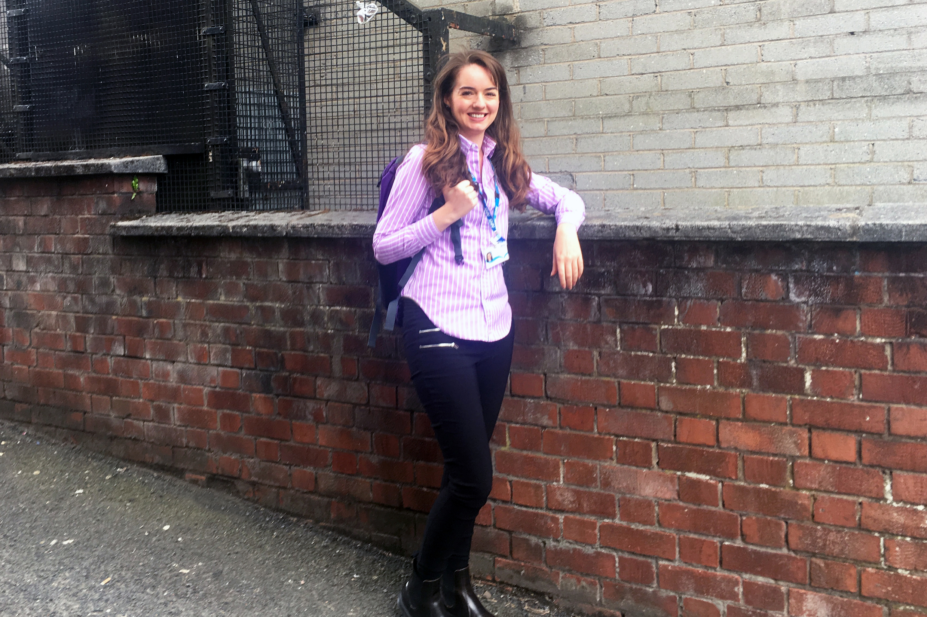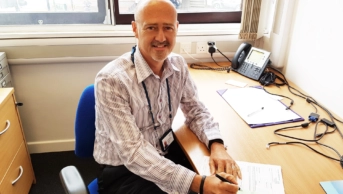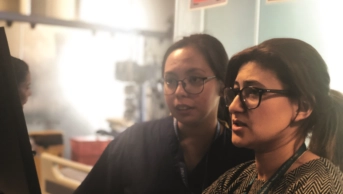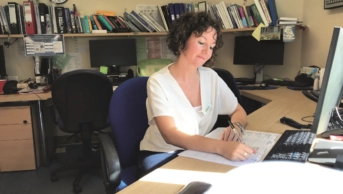
Lauren Gibson
I joined the pharmacy homeless health outreach team at NHS Glasgow Pharmacy Services in 2016. The team has three pharmacist independent prescribers: Kate Stock; Richard Lowrie, the team leader; and myself. We work closely with Sharon Lucey, outreach liaison for homeless charity Simon Community Scotland. Together, we form an innovative health/charity partnership where pharmacists focus on patients’ healthcare needs and Simon Community Scotland supports people with housing and wider social needs. The service is supported by GPs at Hunter Street Homeless Services, which manages the health and addiction needs of service users across Glasgow.
In 2018, I was seconded to NHS Lothian in Edinburgh to develop a similar pharmacy outreach service for Edinburgh city centre. In this service, the pharmacist works in collaboration with David Miller, the outreach liaison for Streetwork, a similar homeless charity to Simon Community Scotland. The team is supported by John Budd, GP lead at the Edinburgh Access Practice in central Edinburgh, and GP fellow Daisy Higginson.
Ease of engagement is crucial, so we aim to offer clinical interventions with no appointment needed
Both pharmacy-led outreach services are first of their kind in Scotland and were recently featured on BBC Scotland national news. Ease of engagement is crucial, so we aim to offer clinical interventions with no appointment needed. We deliver assertive outreach health checks and clinical assessments, which includes prescribing, for people with complex needs experiencing homelessness. Outreach clinics are delivered in accessible venues, such as soup kitchens, day centres and temporary accommodation sites. We also engage with patients through referral from wider collaborators, such as local hospital homeless discharge liaison teams, hospital emergency department discharge teams and addiction teams.
The health of people who experience homelessness is poor and although not all patients will have addiction issues, many will have multiple comorbidities affecting both their physical and mental health. This leads to frequent presentations to hospital emergency departments.
9:00 — start
Today I am working in Glasgow. I meet with Sharon at the Simon Community Hub where we run through our patient lists and current workload. This can consist of new referrals or patients we already work with. I clinically triage and prioritise which patients we see based on urgency and need. We plan our visit to each patient, going wherever we are most likely to engage with them.
10:00
We drive to a homeless hostel in Glasgow and meet our first patient who was admitted and discharged from hospital over the weekend after experiencing a seizure.
He has epilepsy with frequent seizures and insulin-dependent diabetes. He is also an intravenous drug user (cocaine and heroin) and struggles with alcohol misuse. He has one week’s supply of medicine from the hospital, but informs us that it has been a long time since he saw his GP, who is located on the other side of Glasgow to his hostel. He has fallen out of treatment with addiction services and is not on any prescription or psychosocial recovery-orientated support for his drug addiction. This is a good example of the complexity of patients we commonly see.
We meet and introduce ourselves to the patient in the hostel day room. The aim of our consultation is to help the patient as much as possible in that moment in time and for the near future. We register the patient with the specialist homeless GP service, which is more accessible. We refer him to the specialist homeless addiction team using the necessary paperwork we carry with us to ensure no delays. We supply naloxone and provide training in recognising an overdose before signposting the patient to where he can get clean injecting equipment and offer him blood-borne virus testing. We then check his current medicines that were issued on discharge and prescribe another few weeks’ supply of these medicines to ensure he doesn’t run short and to avoid delays.
I arrange a medical review of his seizure control. I take his basic observations, such as blood pressure, temperature, pulse, oxygen saturation and ECG readings using a pocket machine, and measure his height and weight. I note mild hypertension and marked malnutrition so I refer him to the centre’s dietitian. I also check his blood sugars, which are a little high, followed by his insulin adherence and hypoglycaemia awareness. After ensuring there is a fridge in the hostel for him to store his insulin, I make a referral to the community diabetes nurses. Sharon then takes over the consult and chats about longer-term housing options, such as Housing First, a programme which aims to bring people sleeping rough and those caught in the homeless system into secure and supported long-term tenancies. Sharon also offers support with his benefits application and assessment.
Owing to the chaotic nature of this patient group … we have to do everything we can when we have the patient with us
This is a lot to cover in just one meeting, but everything discussed is a priority. Owing to the chaotic nature of this patient group, we may not be able to see him again, so we have to do everything we can while we have the patient with us. We end the consult by giving the patient and the hostel support staff notes which provide details about his referrals, appointment times and any instructions. I plan to meet him at the same time, same place, the next week to follow up — this may not happen, but we plan for it anyway. I leave my details so he can contact me if he does move on. Often patients do remain in contact with us as they move around services.
We then visit another three patients experiencing similar issues.
13:00
Sharon and I grab lunch and summarise what we have done. We note any follow-ups needed, and finish writing our patient notes.
13:30
I then head to my second clinical session of the day, an innovative drop-in clinic hosted from the pharmacy consultation room at Abbey Chemist, Glasgow. This pharmacy also hosts a well-managed needle exchange and methadone service with experienced staff, making it easily accessible to this patient group.
I have an open door policy and patients are free to come and see me — I never turn anyone away. I see on average around four or five patients and the common issues I manage are: skin conditions or infections where I can prescribe antibiotics, malnutrition, minor wounds which I dress, repeat prescribing for long-term conditions, chest infections, and blood borne virus and opioid replacement therapy referrals. In this clinic I have IT access to clinic systems and records which enables me to make thorough clinical assessments and decisions. The most common conditions treated are infected injection site wounds from drug misuse, which otherwise would have gone untreated.
16:30
I end the day updating my clinical records, finishing paperwork, and checking in with the wider team for any clinical handovers.
17:00 – finish
This has been a busy, interesting and engaging day. Pharmacist prescribers have a positive role to play in bridging the gap for those falling through the net as they move between temporary accommodations and various health services and teams, which can be hugely complex to navigate. I hope to see more pharmacists becoming involved in services such as this.
How pharmacists can get a similar role:
- Network, network, network — ask to shadow others in similar roles, attend conferences, get to know the area and those working in it;
- Be prepared to take fixed-term posts / short-term pilot projects and if successful, make a case to turn these into permanent posts;
- Be prepared and confident to work in the “grey area” and to push yourself. Don’t be afraid to go where no pharmacist has gone before. Be confident working safely but with limited guidelines / no prior protocols — you will develop these as you develop the post;
- Educate yourself and upskill — get your clinical pharmacy postgraduate diploma, independent prescribing qualification and clinical skills training. Specific courses in substance misuse and mental health would be helpful;
- Be prepared to be resilient, to overcome resistance, and be realistic about the nature of this work. Approach situations with some humour and humility. Having good people skills goes a long way.


